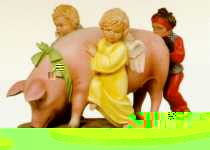Introduction
What is Culture?
What is Cultural Studies?

Ushering in banality 1988 Jeff Koons
from Stedelijk Museum of Modern Art
|
Introduction What is Culture?
|

Ushering in banality 1988 Jeff Koons from Stedelijk Museum of Modern Art |
| What is Cultural Studies? Main Concerns and History |
the five interacting loci of cultural practices in the 'circuit of Culture' Representation, Regulation, Identity, Production, Consumption |
|
2. the widely distributed forms of popular music, publishing, art, design and literature, or the activities of leisure time and entertainment, which make up the everyday lives of the majority of 'ordinary people'-what is called the 'mass culture' or the 'popular culture' of an age.
3. whatever is distinctive about the 'way of life' of a people, community, nation or social group. --shared values/meanings of a group or of society.
[1] outlines some of the broad-ranging debates which have gone on about the concept of culture during the past century.
[2] offer some insight into what the culture debate means in our own lives and to provide some examples of how cultural
meanings are formed, maintained, and changed"